
by Gideon Marcus
Professional opinion
Fred Pohl opens up this month's issue of Galaxy with a summary of the letters he's received from readers on how they would, in 100 words or fewer, successfully resolve the war in Vietnam. He has great faith in the power of harnessing a bunch of smart folks to spit out solutions to problems. I honestly don't know how useful someone's cursory stab at peace in Southeast Asia can be, even if it's from the pen of a clearly clever person like Judith Merril or Larry Niven.
He did, however, talk about a different kind of brain-tapping, one that has me very excited. There's something called Sigma, which is a scientific way of presenting scenarios to people and assessing their likelihood, feasability, and desirability. A consensus can then be reached and a mass-mind prediction derived.
And as it turns out, I recently was sent a copy of Probe a 14-volume compilation of technological predictions made by the folks at TRW's Space Technology Laboratories—the folks who gave us Pioneers 0, 1 and 2, Explorer 6, Atlas Able, Pioneer 5, the Orbiting Geophysical Observatory, and parts of the Apollo Lunar Excursion Module. I've only just started perusing it, but it makes for fascinating reading. Of course, only time will tell if their predictions are accurate, or if they're even asking the right questions.


Of course, science fictioneers have been predicting the future in their own way for half a century. And while the stories in this issue may not depict situations that ever come to pass, I have to say that are, at least, quite entertaining!
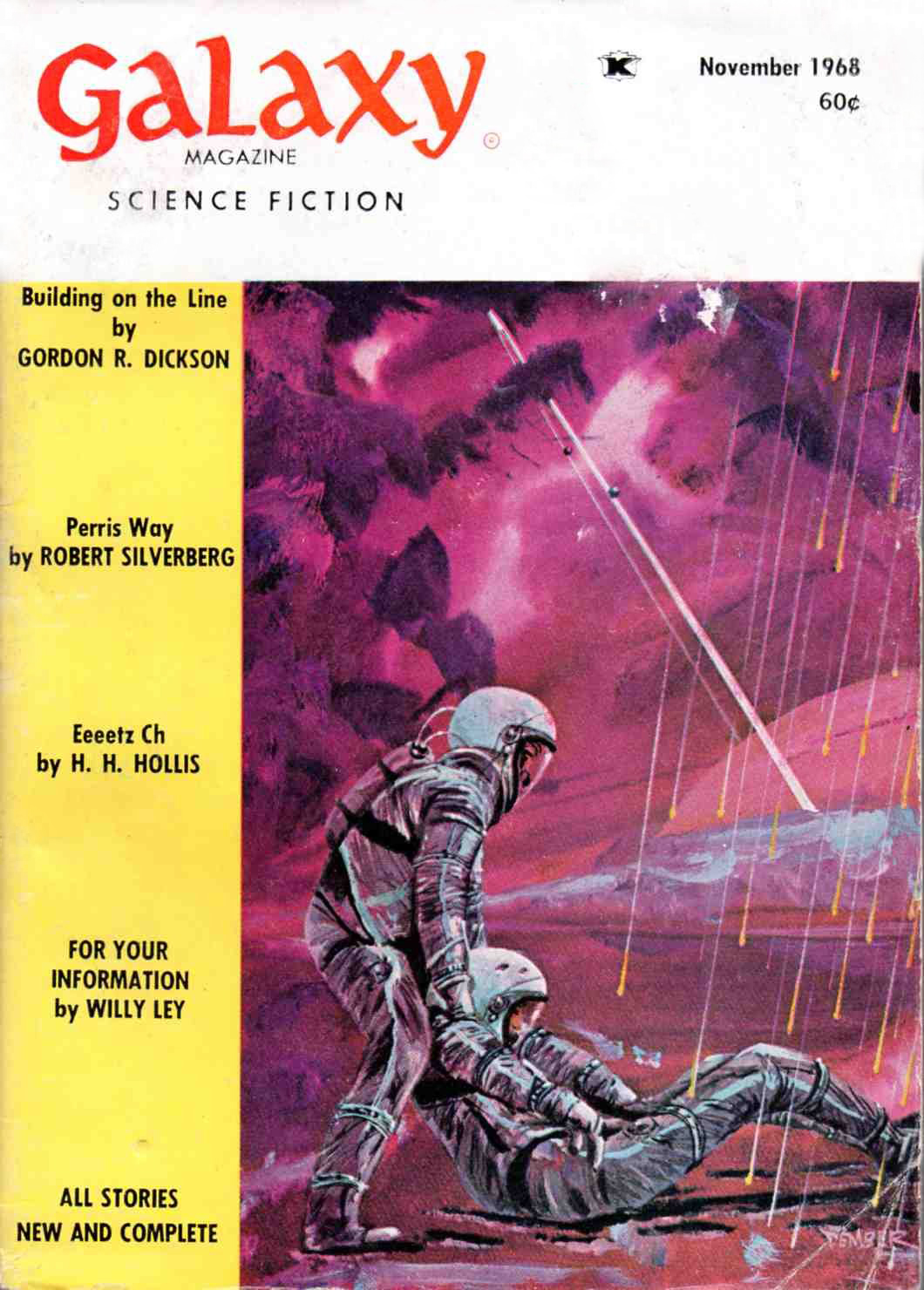
by Sol Dember, illustrating Building on the Line
Perris Way, by Robert Silverberg

by Jack Gaughan
I had not expected a continuation of the story, "Nightwing," but "Perris Way" is a direct sequel. The tale picks up with our nameless Watcher, whose profession of scanning the skies for alien invasion, is no longer relevant as the invasion has come and succeeded, heading toward Perris (Paris) with his companion, the former Prince of Roum. That latter, a member of the Dominator caste, was blinded during the invasion by the alien-in-disguise Gormon for forcing himself upon the Flier, Avluela, whom Gormon loved. The two arrived at France's former capital to become members of the guild of Rememberers.
The erstwhile Watcher becomes an apprentice, and during his training discovers the true history of Earth and the hubristic crime that warranted the alien invasion. His halcyon half-year with the Rememberers is abruptly terminated when the Prince shames the guild with a tactless act. The Watcher, caught on the horns of a dilemma comprising the remedy to a Rememberer's anger versus (perhaps misplaced) loyalty to the Prince, comes up with a solution that ultimately pleases no one. It also leaves room for a Part 3, which, if a novelization be forthcoming, is probably necessary to reach the appropriate length.
Silverbob's language is exquisite. His poetic SFnal prose is probably even better than Zelazny's, and more approachable than Delany's. His history of Earth is as fascinating as any that has been drawn. On the other hand, he never treats his women well, and they are always sex objects, one way or another. Contrast that with James Schmitz's Dr. Nile Etland, showcased just last month in Analog, lest someone want to lecture me on how "this is just the way things are." Women do not exist just to be scenery, as much as those who hum "I'm a Girl Watcher" and hound the bosomy New Yorker Francine Gottfried on the way to work might like to think so.
It's still terrific stuff, but I can't give it more than four stars.
Keep Moving, by Miriam Allen deFord
Science fiction stories often play with the premise, "If this goes on…" DeFord, one of the genre's most venerable authors, offers up a 22nd Century in which freeways pave virtually every square inch of the planet, and commuter culture has become the norm. People don't even have homes anymore—they simply live in their cars, driving constantly to obtain food, entertainment, and presumably working while moving.
One man decides he's had enough and founds the "Live-In" movement, boldly staying put in one place over night. This crazy idea wins the casual endorsement of dozens and the fervent support of one particular woman, a rather famous poet. The ensuing partnership proves unstoppable.
Absolutely silly, but also quite charming. Three stars.
Building on the Line, by Gordon R. Dickson
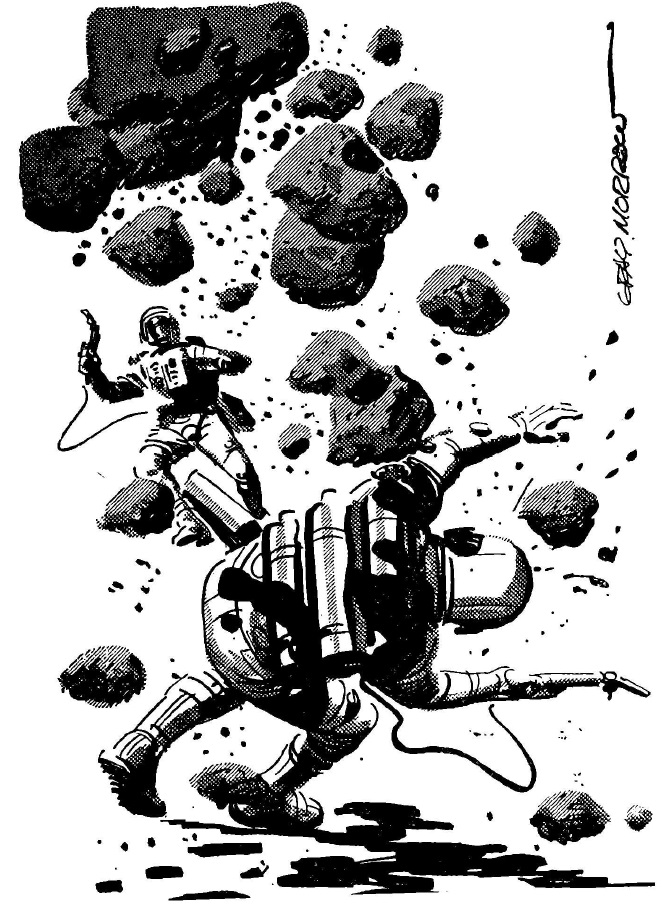
by Gray Morrow
Clancy and Plotchin are mismatched, feuding workers on the Line, a galaxy-spanning set of teleporter stations. The two are building a set of Starlinks on the hostile world of XN-4010 when its incorporeal, gibbering race of "hobgoblins" unleashes a meteorite storm upon them. Plotchin is incapacitated, maybe dead, but there is hope that an experimental cryogenic unit in the man's suit might be sustaining him.
Clancy decides that staying put and waiting for rescue is less desirable than making the 36-mile trek back to the main exploration ship. And so, with Plotchin in his arms, he begins the brutal trek through the ice and near-vacuum of XN-4010, the hobgoblins nibbling at his psyche the entire way. This bit is truly thrilling, reminiscent of the middle section of Heinlein's Have Spacesuit, Will Travel when our heroes are making a similar journey across the frozen wastes of Pluto.
The denouement, however, is a rather windy extolling of the virtues of heroic men expanding the horizons of mankind. It all felt a little hollow, especially as it is intimated that the hobgoblins may not be malicious but simply trying to defend their world from an onslaught of human tourists. That, to me, was the more important point, and it was tossed aside. Framed differently, Line's premise could have made an excellent novel, with themes similar to those explored brilliantly in Silverberg's The Man in the Maze. Alas.
Still, it's beautifully written, and the first two thirds are a wild ride.
Four stars.
For Your Information: My Friend, the Nautilus, by Willy Ley
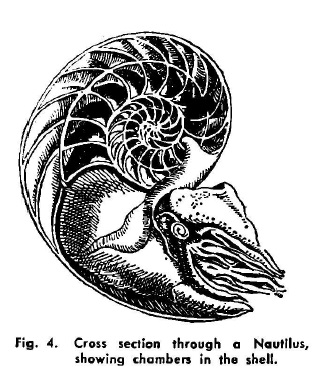
This is quite a neat piece, definitely a throwback to Willy's better days. It's really the evolutionary history of mollusks, with an eventual focus on nautiloids and their relatives, the ammonites. No, this is not a Pennsylvania religious sect but a prolific family of shelled mollusks that thrived during the Age of Dinosaurs.
Given that octopuses (Ley calls the plural 'octopi', tsk tsk) are shockingly intelligent, and ammonites were advanced nautiloids, I think stories about sapient Mesozoic shellfish would be fascinating. Be sure to credit me with the idea if you use it.
Four stars.
The Market in Aliens, by K. M. O'Donnell
An unscrupulous fellow runs a brisk trade in sapient aliens. He has occasional twinges of guilt, but he perseveres, nevertheless.
This is a dark, ugly story. Looking back on it, I think I have to give it four stars. It says a lot with a little.
Locust Years, by Douglas R. Mason
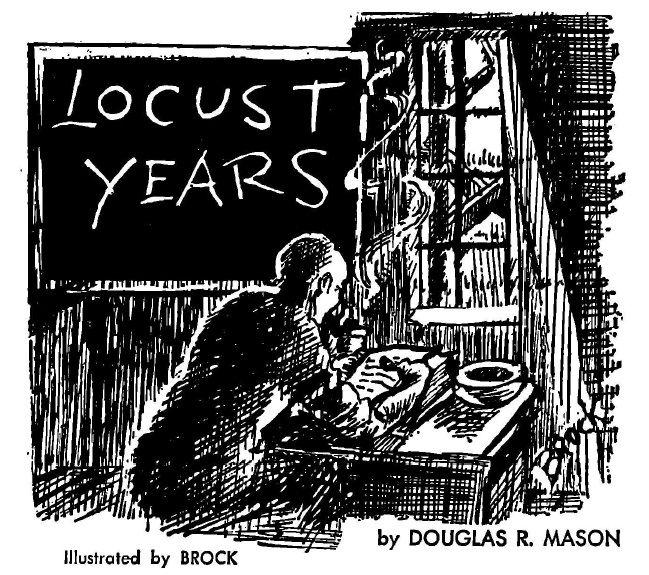
by Brock
In the not too far future, universities literally recreate the past, casting lines through time to reel in prehistorical happenings for student viewing. But when a construction accident summons a wounded mastodon and opens up a time vortex, no one is safe—up to and including humans from other time frames!
This is an interesting story, if initially difficult to apprehend. Probably the best thing the author has written to date. Three stars.
The Tell-Tale Heart-Machine, by Brian W. Aldiss
This one's about bitter, middle-aged man, reeling from the recent loss of his wife and his ejection from the board of the company that made his fortune. Said company has discovered the secret of synthetic life, starting with the recreation of dinosaurs, and with the aim of creating complete humans. Ostensibly, the man hates his father-in-law, erstwhile partner in the endeavor, for his lack of morality, and for the coldness he has hitherto shown his family. In fact, there is something deeper going on, and a rift that may not be mendable, even as the father-in-law attempts to attone.
I found myself moved by this one. Definitely one of Aldiss' better efforts of late.
Four stars.
Eeeetz Ch, by H. H. Hollis
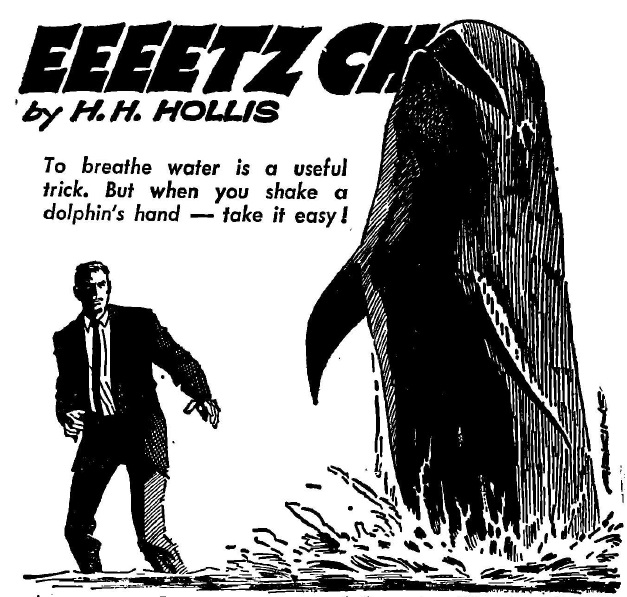
by Dan Adkins
I had gone into this one expecting from the title some sort of joke story. It's not.
Dolphins are hot news this decade. From Flipper to People of the Sea to World of Ptavvs, the idea of porpoises being partner sapients is catching on in a big way. Hollis' story details the visit of the junior Senator from Hawaii, Ramon Coatl (presumably of Filipino ancestry), to a Caribbean research center. There, the dolphin called Andy but really named Eeeetz Ch is being fitted with artificial hands and tested on advanced machinery. But the tests go both ways—the two scientists working with him (a man and a woman, the woman being the senior engineer; Silverbob, take notes) are fitted with artificial gills that plug into a plate surgically embedded in their sternums.
There's doesn't exactly seem to be a plot to the whole thing, until it's done, and you understand the stakes of Coatl's visit. Hollis says a lot about intelligence and handicaps, about technology and ethics, without spelling it out too heavy-handedly. Most impressively, all of the characters are extremely well realized. Andy the dolphin, in particular, is an alien. A likeable, sympathetic one, but not human.
This is my favorite story of the issue. It's both conventional and new, prosaic and profound. It made me laugh a couple of times. It kept me riveted.
Five stars.
Like, wow!
What a contrast, huh? Last month, Galaxy finished at a dismal 2.4. This month, we're at 3.9, probaby the best mag of the year. It reminds me of the old Gold days of the early '50s. Of course with a spread like that, it's hard to make any solid predictions, but at least there's always a chance every month that Galaxy will knock it out of the park like it did this month.
That's something to look forward to!
(oh, and dig the cool offer on the back of the mag—Trek is everywhere!)


![[October 8, 1968] Probing the future (November 1968 <i>Galaxy</i>)](https://galacticjourney.org/wp-content/uploads/2023/10/681008cover-672x372.jpg)


![[August 12, 1968] <i>Galaxy's the One</i>? (the September 1968 <i>Galaxy</i>)](https://galacticjourney.org/wp-content/uploads/2023/08/680812cover-1-scaled.jpg)












